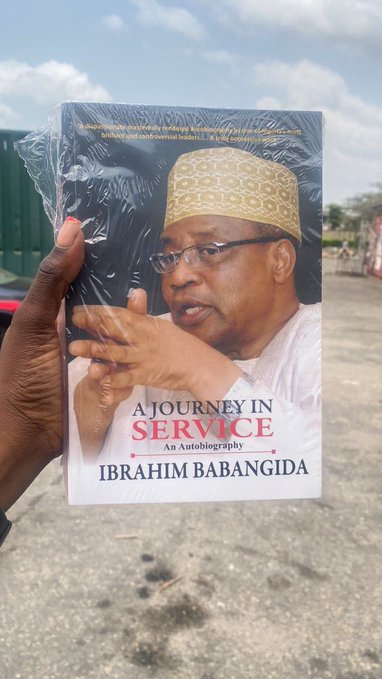Nigeria’s social media platforms were shaken on Friday as pirated versions of the much-anticipated autobiography of former Military President, Ibrahim Badamasi Babangida, titled A Journey in Service, flooded the internet just hours after its official launch. Within a blink, the book made its way to WhatsApp groups, X (formerly Twitter), and other platforms, sparking outrage and disappointment among many Nigerians.
The autobiography, which recounts the remarkable and often controversial journey of one of Nigeria’s most influential military leaders, had been eagerly awaited for years. However, what should have been a historic moment quickly became marred by the proliferation of unauthorized digital copies, making it widely available for free download.
Despite a star-studded launch event in Abuja the day before, the book’s much-hyped release was overshadowed by the sudden appearance of its pirated versions on social media. Links to free downloads appeared almost immediately on platforms such as X, causing the book to go viral within hours.
“We have witnessed an alarming rise in pirated copies of books and intellectual property across social media platforms, and IBB’s autobiography is no exception,” said Akin Alabi, a prominent Nigerian entrepreneur. Alabi, who was vocal on X about the spread of the pirated content, expressed his frustration: “It’s disappointing to see this happen to such an important work. The level of piracy is growing out of control, and it is affecting not just authors but the entire creative industry.”
At the heart of the controversy is the rapid spread of pirated PDF versions. Within minutes of being uploaded to WhatsApp, the links were shared across multiple groups, and several users even shared page-by-page snippets of the autobiography. This free distribution has not only enraged those involved in the book’s production but has also sparked a broader debate on the ease with which intellectual property can be stolen in the digital age.
The book’s launch, which took place in Abuja, was attended by many prominent figures, including President Bola Ahmed Tinubu, former President Olusegun Obasanjo, and Ghanaian President Nana Akufo-Addo, who gave the keynote address. Although former President Obasanjo was initially slated to chair the event, his absence raised eyebrows, and no official reason was given for his nonappearance. Meanwhile, former Vice President Yemi Osinbajo reviewed the autobiography, adding further gravitas to the occasion.
However, amid all the fanfare surrounding the event, the pirated copies took center stage within hours. For many Nigerians, the emergence of these unauthorized versions has undermined the significance of the autobiography.
“I can’t believe how quickly the pirated copies are spreading. Just a day ago, we were celebrating the launch, and now this,” a Twitter user lamented. “Why would anyone pay when they can get it for free? The value of the book has been tarnished.”
The theft of intellectual property is not a new issue in Nigeria, and this incident highlights the broader challenges faced by authors, musicians, filmmakers, and other creatives. Many have long struggled with piracy, which continues to rob them of the financial returns and recognition they deserve.
In this case, the timing couldn’t be worse for IBB, whose autobiography was anticipated to be a significant revenue generator. The cost of producing the book and the subsequent marketing campaign meant that the sale of physical and digital copies was expected to yield substantial returns. With millions of Nigerians now having access to free copies, the likelihood of the former military president recouping his investment seems unlikely.
Despite the overwhelming spread of pirated versions, IBB has yet to make any official statement regarding the situation. His team has remained silent on the matter, though industry insiders speculate that the former military president may soon respond publicly, given the scale of the piracy.
For some, the situation is symptomatic of a larger societal issue in Nigeria. “Piracy has become too entrenched in our culture, and it’s hurting creators,” said Chika Nwachukwu, a Lagos-based intellectual property lawyer. “There are few consequences for those who distribute pirated materials. Until there is a strong legal framework to combat this, we will continue to see incidents like this.”
The piracy crisis surrounding A Journey in Service raises several critical questions: How much longer can authors and content creators continue to face such widespread theft of their works? What role do platforms like WhatsApp and X play in enabling the rapid spread of pirated content? And, perhaps most importantly, how can Nigeria’s legal system address the deepening problem of digital piracy?
While the answers remain unclear, the damage is evident. The fast-paced spread of pirated copies suggests that Nigeria’s intellectual property laws may not be robust enough to tackle the growing wave of online piracy.
As it stands, IBB’s autobiography, which was meant to be a memoir of historical significance, has become a cautionary tale about the vulnerabilities of intellectual property in the digital era. What should have been a celebratory moment for Nigeria’s literary and political community has instead cast a shadow over the country’s commitment to protecting the works of its creatives.
The speed at which the autobiography has been pirated raises critical concerns about the protection of intellectual property in an increasingly digital world, where the lines between lawful access and piracy are becoming more difficult to define.
The story of IBB’s autobiography may not yet be over, but its journey has taken a detour, one that is unlikely to be forgotten anytime soon.

